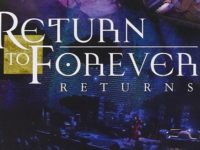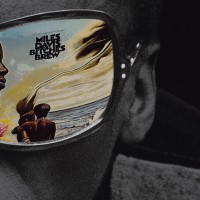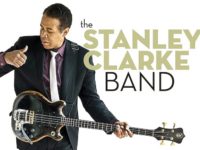Fusion jazz drummer Lenny White is prepping for a reunion with the newly expanded Return to Forever, which will make 32 stops in the U.S. beginning in Pittsburgh on Aug. 7. The newest members are former Mahavishnu Orchestra violinist Jean-Luc Ponty and guitarist Frank Gambale.
But White’s life away from a band he’s played with off and on since the early 1970s has remained as hectic as it is varied. After releasing the well-regarded Anomaly, his first solo album in 10 years, White went right into sessions with a Neapolitan singer — even while he continued work on a lengthy opera project.
“Return to Forever is on the docket at this minute,” White told us in a recent interview. “At the same time, I’m writing music — and I’m looking at different projects to produce. It’s like an actor, reading through scripts.”
In the latest Something Else! Sitdown, White also discussed legendary associations with Miles Davis and Freddie Hubbard, the difficulties of bringing to life his jazz-fusion rethinking of Earth, Wind and Fire — and fitting a fiddler into Return to Forever’s long-established sound …
NICK DeRISO: Last year’s Anomaly, a meaty recording that recalls your 1970s work with Miles and then Return to Forever, was bold move back into fusion. Key collaborators from your 1978 solo album Adventures of Astral Pirates also returned, something that really cemented the old-school fusion vibe.
LENNY WHITE: We’ve gotten away from the authentic sounds, from authentic music. Everything is a hybrid these days. It’s a kind of special when you can actually hear something that has some authenticity — and it’s new. Usually what happens is you have to go back and listen to older music because people have gone away from making music that sounds that way. I basically went back to how I heard music and how music used to sound to me when I listened to the radio. There were so many different kinds of music. DJs would play everything from Led Zeppelin to James Brown to Miles Davis. That’s how I processed music, and I wanted to represent that feeling again.
NICK DeRISO: You were part of the funky orchestra that shaped Miles Davis’ Bitches Brew, a recording that has moved from being influential into the mythical. What made it so special?
LENNY WHITE: It was pretty organic. I think what was really special about that project, and I haven’t witnessed anything like it since then, was you had 11, 12 musicians in the studio, all at the same time playing music. Miles wanted to bring all of those different people into one place and to have the focus be on creating music. Usually what happens if you bring that many people in the studio you put music in front of them and they improvise from that. This was totally different. This was a situation where we were told to play off of what you hear from one another, then to take it to another level. That’s what was great about that record: Together, we created this thing that has lasted.
NICK DeRISO: Freddie Hubbard moved into an interesting mix of hard bop and soul jazz on 1970’s Red Clay, another well-regarded record with an all-star lineup. So how come you never liked your own performance?
LENNY WHITE: Freddie called me and he said: ‘I’ve got a date with (pianist) Herbie Hancock and (saxophonist) Joe Henderson.’ When I was talking to him, I said, ‘That’s cool.’ Inside, though, I was screaming. That was all the guys I listened to coming up, a really great opportunity for me. I go in to make the record with my oil-can bass drum — the same metal bass drum I had used on Bitches Brew. I’m in there playing and (bassist) Ron Carter says it’s too resonant. (Producer) Rudy Van Gelder goes in the back and pulls out this huge 28-inch drum — and it sounds like you are hitting a brick. No response whatsoever. I wanted to put my best foot forward, and I had to play this horrible drum. It was traumatic. I didn’t listen to that record for 10 years. I hated it. I just heard every mistake I made. Now, young players play it — and they play my mistakes! (Laughs.)
NICK DeRISO: What took so long for 2004’s Earth Wind and Fire tribute record from the Lenny White Project, recorded in 1998, to finally see the light of day?
LENNY WHITE: What happens, I believe, is that things that are not in the mainstream, things that are an anomaly, are hard to get to the surface. It’s hard to get something like that exposed — especially now. Music is now used to sell things. It’s not like it used to be. The value of what music does and what it is and its place in the community has totally changed. That’s also changed the way artists make music.
NICK DeRISO: As you joined Chick Corea’s Return to Forever for Hymn of the Seventh Galaxy in 1973, the band took a dramatic turn toward more muscular jazz-rock. Was that the idea going into the album, or something that evolved as the sessions went on?
LENNY WHITE: What made Return to Forever special was, we were a jazz rhythm section with guitar. We bumped up the sound. It was a jazz quartet on steroids. Weather Report, for instance, was Joe Zawinul, Wayne Shorter, Miroslav Vitous and Alphonse Mouzon. They were jazz musicians too, but they were more of a horn band. Return to Forever was different, a jazz rhythm section that expanded with electric guitar and electric bass and electric keyboards.
NICK DeRISO: You left the band after its biggest selling record, 1976’s Romantic Warrior, before returning to Return to Forever in 2008. More recently violin virtuoso Jean-Luc Ponty has joined the touring unit. What has he brought to the band’s sound?
LENNY WHITE: It’s a totally different thing now. We have to rethink some of this music, because of the inclusion of the violin. It’s given the music another dimension. It’s a different voice than what we’ve used. For years, it was a quartet. Back then, we worked to get a quartet to sometimes sound like a quintet. Now, we get to see if a quintet can sound like a full orchestra.
- Nick DeRiso’s Best of 2015 (Rock + Pop): Death Cab for Cutie, Joe Jackson, Toto + Others - January 18, 2016
- Nick DeRiso’s Best of 2015 (Blues, Jazz + R&B): Boz Scaggs, Gavin Harrison, Alabama Shakes - January 10, 2016
- Nick DeRiso’s Best of 2015 (Reissues + Live): John Oates, Led Zeppelin, Yes, Faces + others - January 7, 2016





Pingback: How 'Stanley Clarke Band Featuring Hiromi' Recalled a Funky Past